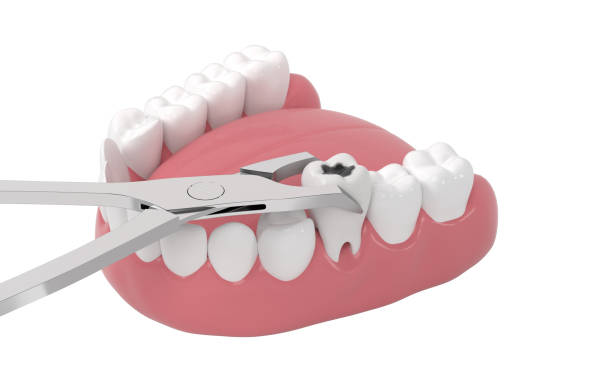Most dentists prefer to repair and save a tooth when they possibly can, but in some cases, extraction of the tooth is the only realistic option. While the procedure may seem daunting and even frightening, tooth extraction is a fairly common dental procedure. If you’re facing an extraction, here are some of the things to know and expect.

Most Common Reasons for Extraction
As we said, a dentist will prefer to save a tooth, if at all possible, but in some cases extraction is necessary. These include:
- Overcrowding – In cases of overcrowding, it may be necessary to remove one or more of your natural teeth. Extraction makes room for the remaining teeth to move into their proper positions. In situations involving orthodontic treatment, extraction may be essential to relieve overcrowding and create room for the remaining teeth to move into their proper place.
- Extensive damage or decay – Modern dental technology often allows dentists to perform near miracles saving teeth that are damaged or decayed. In some cases, however, the damage is so extensive or the decay is so deeply embedded in the root of the tooth that extraction becomes necessary.
- Baby teeth and wisdom teeth removal – In rare cases, your baby teeth don’t fall out as they should and must be removed to make room for the permanent teeth waiting to emerge through your gums. And then there are those wisdom teeth, or third molars, that often begin coming in around the age of 17 and must be removed because they’ve come in crooked or they’re crowding your other teeth and generally creating discomfort.
Types of Extractions
There are numerous reasons why a patient needs to pursue a tooth extraction. We’ve listed a few of those reasons below:
- Simple extraction – This procedure is the more common of the two in which dental forceps are used to remove teeth that are visible above the gum line. Normally the patient can leave as soon as the bleeding has stopped.
- Surgical extraction – This procedure is performed when the teeth to be removed are not easily accessible, like impacted teeth that have not broken through the gum line. This is often the case with wisdom teeth. The procedure may be performed by a general dentist, or the dentist may refer you to an oral surgeon for the procedure.
In cases of simple extractions, the dentist will numb the area around the tooth with a local anesthetic before removing it. For a surgical removal, it may be necessary to administer an intravenous (IV) anesthesia. This could vary from conscious sedation to a general anesthesia that puts you to sleep. If a general anesthesia is used, you’ll need someone to drive you home after the procedure.
Tooth Extractions: Aftercare
The healing process after a tooth is pulled is just as important as the procedure itself. You need to take special care in the days and weeks following a tooth extraction. These are just a few of the things you should do following your extraction procedure to promote healing and avoid problems.
- Pain medication – Your dentist will probably prescribe pain medication you’ll probably need to take for about a week after the procedure. You should get the prescription filled and take the medication as prescribed to reduce the pain.
- Food – For several days after the procedure, avoid hard-to-chew foods as well as food that is hot and spicy. Soft dishes like mac and cheese and mashed potatoes are recommended. Take special care to consume foods around the extraction site if you can.
- Mouth rinse – To prevent an infection after your tooth removal, rise your mouth with a teaspoon of salt dissolved in 8 ounces of water 2 to 3 times a day.
- Brushing and flossing – You can begin normal brushing and flossing about 24 hours after your procedure but be careful when cleaning around the extraction area.
- Blood clot – A blood clot will form in the tooth socket where the removal was performed. This is the gum’s way of healing. If you somehow dislodge the blood clot, the site will create what is known as a dry socket, which leaves the jawbone exposed. If this happens, call your dentist immediately for help.
Tooth Care Services In Mundelein, IL
The doctors at North Suburban Dental provide a full range of oral health services, including both general and restorative dentistry at our locations in Highland Park, Mundelein, and Northbrook. If you’re having dental issues and think you may need an extraction procedure, contact any of our three clinics to schedule an appointment with one of our doctors.
At North Suburban Dental, we provide the very best dental care in a warm, nurturing environment for all our patients. If the thought of a tooth extraction makes you nervous, we can help. If you need an extraction for a broken tooth that can’t be saved or you’re having trouble with wisdom teeth, we hope that you’ll contact us to schedule an appointment. Our dentists will take the time to listen to your concerns and explain the options available for a comfortable and pain-free extraction experience.
Whatever your dental needs, we hope you’ll contact North Suburban Dental at your first opportunity.



